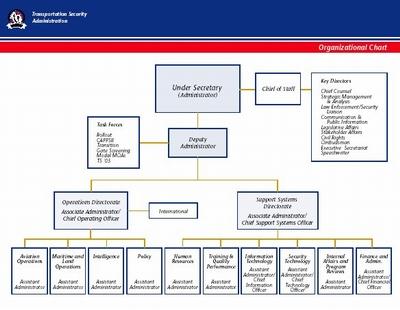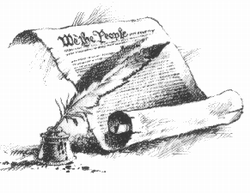Thoughtful Analysis of Why TSA is Out of Bounds
While public reaction to the TSA's ruling that the FAA
pull airman's certificates at the agency's whim was swift as well as negative, the
Teamsters held back on public pronouncements. On Wednesday, though,
the union filed its formal answer to the TSA's power-grab; and it's
devastating. Conclusion: the TSA is attempting something
unprecedented, unworkable, and unconstitutional. Here are excerpts
from the well-made union argument:

Re: Docket No: TSA-2002-13732-37 (Threat
Assessment Regarding Citizens of the United States Who Apply For
FAA Certificates;
Docket No: FAA-2003-14293-310 (Ineligibility for
Airman Certificate Based on Security Grounds)
 This procedure violates the
Fifth amendment to the United States Constitution. There are no due
process provisions in the above-referenced rules even though the
revocation or denial of an airman certificate will effectively end
an employee's career in the aviation industry. Further, the
individual has no meaningful opportunity to defend his reputation,
even though the stigma of being labeled a "security threat" by the
U.S. Government will stifle his attempts to find employment outside
the aviation industry...
This procedure violates the
Fifth amendment to the United States Constitution. There are no due
process provisions in the above-referenced rules even though the
revocation or denial of an airman certificate will effectively end
an employee's career in the aviation industry. Further, the
individual has no meaningful opportunity to defend his reputation,
even though the stigma of being labeled a "security threat" by the
U.S. Government will stifle his attempts to find employment outside
the aviation industry...
The Due Process Clause of the Fifth Amendment prohibits the
United States from depriving any person of property or liberty
Without "due process of law." ...Without an airman certificate, a
pilot, airline mechanic or flight instructor is prohibited
altogether from earning a living at his or her chosen profession
anywhere within the United States... certificate holders and
applicants have a liberty interest in maintaining their reputation
and good name.
[Speaking of that 'good name']
The above-referenced rules allow TSA to designate certificate
holders and applicants as "security threats." ...It is hard to
imagine a worse "badge of infamy" than being considered a potential
terrorist by your own government. Certificate holders and
applicants have a liberty interest in avoiding this "stain" and
maintaining their good name.
[No meaningful notice; no due process in TSA's mandate]
 Though a full evidentiary hearing is
not required, certificate holders and applicants must still be
given meaningful notice and an opportunity to be heard prior to
losing their liberty and property interests in their airman
certificates. At a minimum, the individual certificate holder or
applicant must be afforded
Though a full evidentiary hearing is
not required, certificate holders and applicants must still be
given meaningful notice and an opportunity to be heard prior to
losing their liberty and property interests in their airman
certificates. At a minimum, the individual certificate holder or
applicant must be afforded
- notice of the substantive evidence against him,
- a chance to respond both orally and in writing, and
- a chance to provide affidavits and statements from rebuttal
witnesses.
...Further, TSA must bear the burden of demonstrating that the
individual is a security threat. As will be shown below, TSA's
procedures fall short of these minimum requirements. ...The most
significant due process violation in TSA's procedures is its
failure to provide any notice to the individual certificate holder
or applicant of the substantive evidence against him.
[It's impossible to mount a defense, or even understand the
accusation]
Additionally, TSA's current policy of withholding evidence
denies any possibility of meaningful administrative or judicial
review. ...Due process also requires that the individual
certificate holder or applicant be given an opportunity to respond
orally to the evidence and charges against him...
In determining whether a particular certificate holder or
applicant poses a security threat, a wide variety of intelligence
information from sources both inside and outside the United States
will clearly be relevant. ...This is especially important here,
where the TSA may be considering information from a variety of
intelligence sources and it may not be easy for the certificate
holder or applicant to discern what information TSA considers to be
most relevant.
['guilty until proven innocent']
 Finally, TSA's procedures violate
the due process provision of the Fifth Amendment because they place
the burden of proof on the individual certificate holder or
applicant to demonstrate that he is not a security threat. The
government must bear the burden of proof whenever it takes action
against an individual. ...due process requires, at a minimum, that
the individual he provided with notice of the charges and evidence
against him and an opportunity to respond both orally and in
writing, including the opportunity to present affidavits and
statements from witnesses.
Finally, TSA's procedures violate
the due process provision of the Fifth Amendment because they place
the burden of proof on the individual certificate holder or
applicant to demonstrate that he is not a security threat. The
government must bear the burden of proof whenever it takes action
against an individual. ...due process requires, at a minimum, that
the individual he provided with notice of the charges and evidence
against him and an opportunity to respond both orally and in
writing, including the opportunity to present affidavits and
statements from witnesses.
[Definition itself is vague]
TSA's rules define "security threat" as follows: "An individual
poses a security, threat when the individual is suspected of
posing, or is known to pose (1) a threat to transportation or
national security; (2) a threat of air piracy or terrorism; (3) a
threat to airline or passenger security; or (4) a threat to civil
aviation security."
TSA does not define what constitutes a "threat," nor does it
explain what specific criteria TSA will use in determining whether
or not an individual poses a threat. This definition is
unconstitutionally vague and violates the Due Process Clause of the
Fifth Amendment.
"It is established that a law fails to meet the requirements of
the Due Process Clause if it is so vague and standardless that it
leaves the public uncertain as to the conduct it prohibits..." City
of Chicago v. Morales, 527 U.S. 41, 56 (1998). The offense to due
process lies in both the nature and consequences of
vagueness...
[...and the heart of the matter: TSA's motives exposed!]
 These regulations do not
prescribe specific criteria for determining whether an individual
poses a security threat. The rules put no limits on a TSA
decisionmaker's discretion in determining whether an individual
poses a security threat. The rules therefore encourage arbitrary,
inconsistent, and discriminatory enforcement...
These regulations do not
prescribe specific criteria for determining whether an individual
poses a security threat. The rules put no limits on a TSA
decisionmaker's discretion in determining whether an individual
poses a security threat. The rules therefore encourage arbitrary,
inconsistent, and discriminatory enforcement...
 ANN's Daily Aero-Term (04.24.24): Runway Lead-in Light System
ANN's Daily Aero-Term (04.24.24): Runway Lead-in Light System ANN's Daily Aero-Linx (04.24.24)
ANN's Daily Aero-Linx (04.24.24) Aero-FAQ: Dave Juwel's Aviation Marketing Stories -- ITBOA BNITBOB
Aero-FAQ: Dave Juwel's Aviation Marketing Stories -- ITBOA BNITBOB Classic Aero-TV: Best Seat in The House -- 'Inside' The AeroShell Aerobatic Team
Classic Aero-TV: Best Seat in The House -- 'Inside' The AeroShell Aerobatic Team Airborne Affordable Flyers 04.18.24: CarbonCub UL, Fisher, Affordable Flyer Expo
Airborne Affordable Flyers 04.18.24: CarbonCub UL, Fisher, Affordable Flyer Expo







